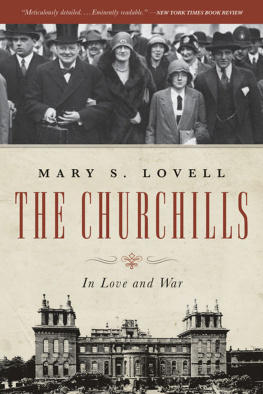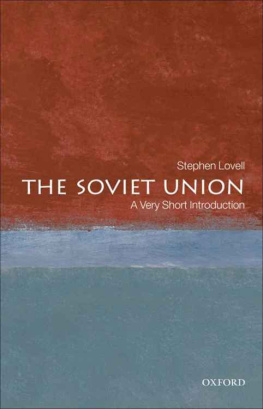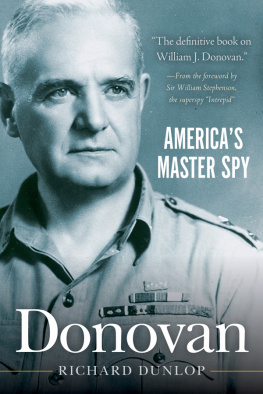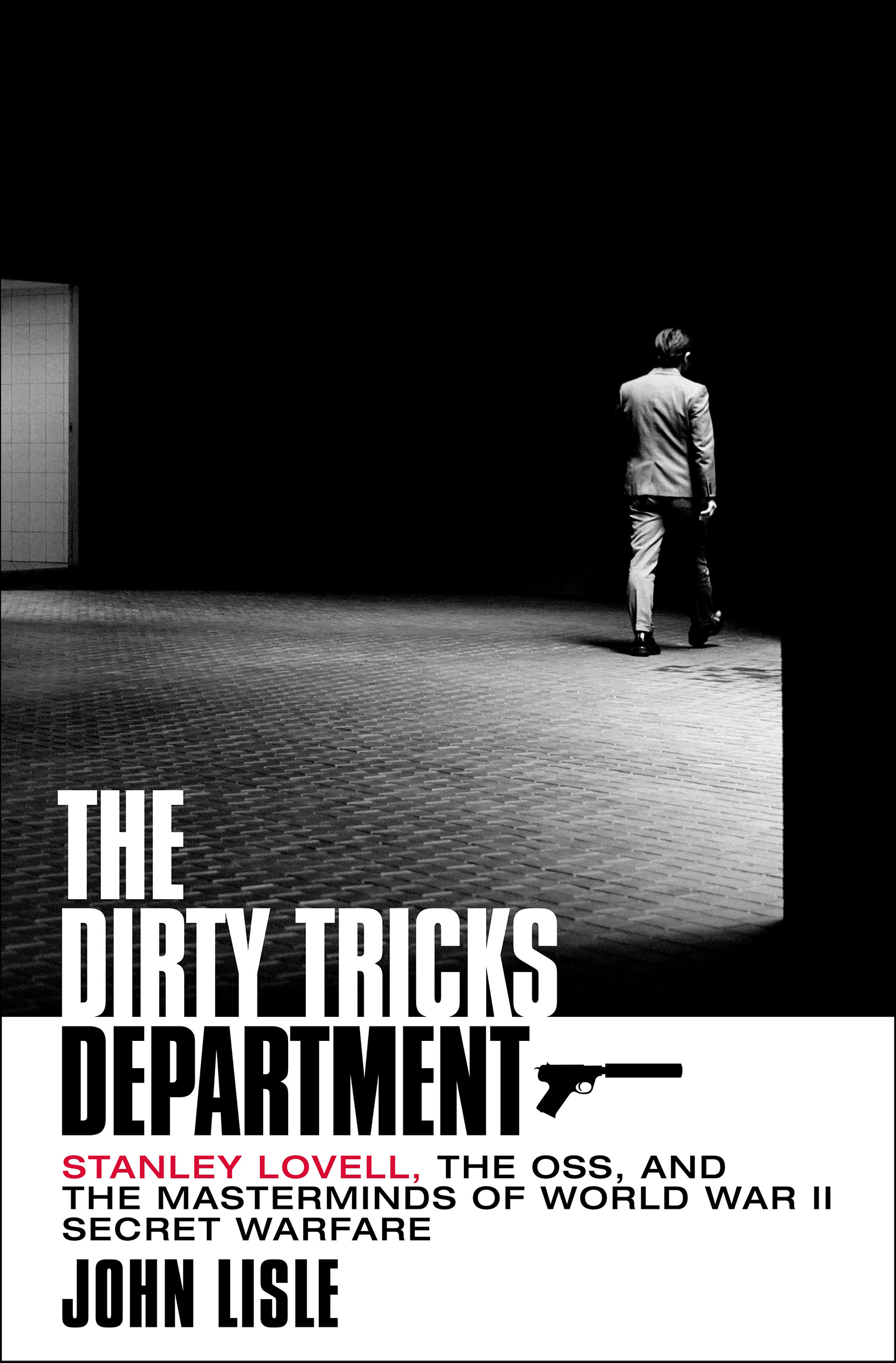Contents
Guide
Pagebreaks of the print version

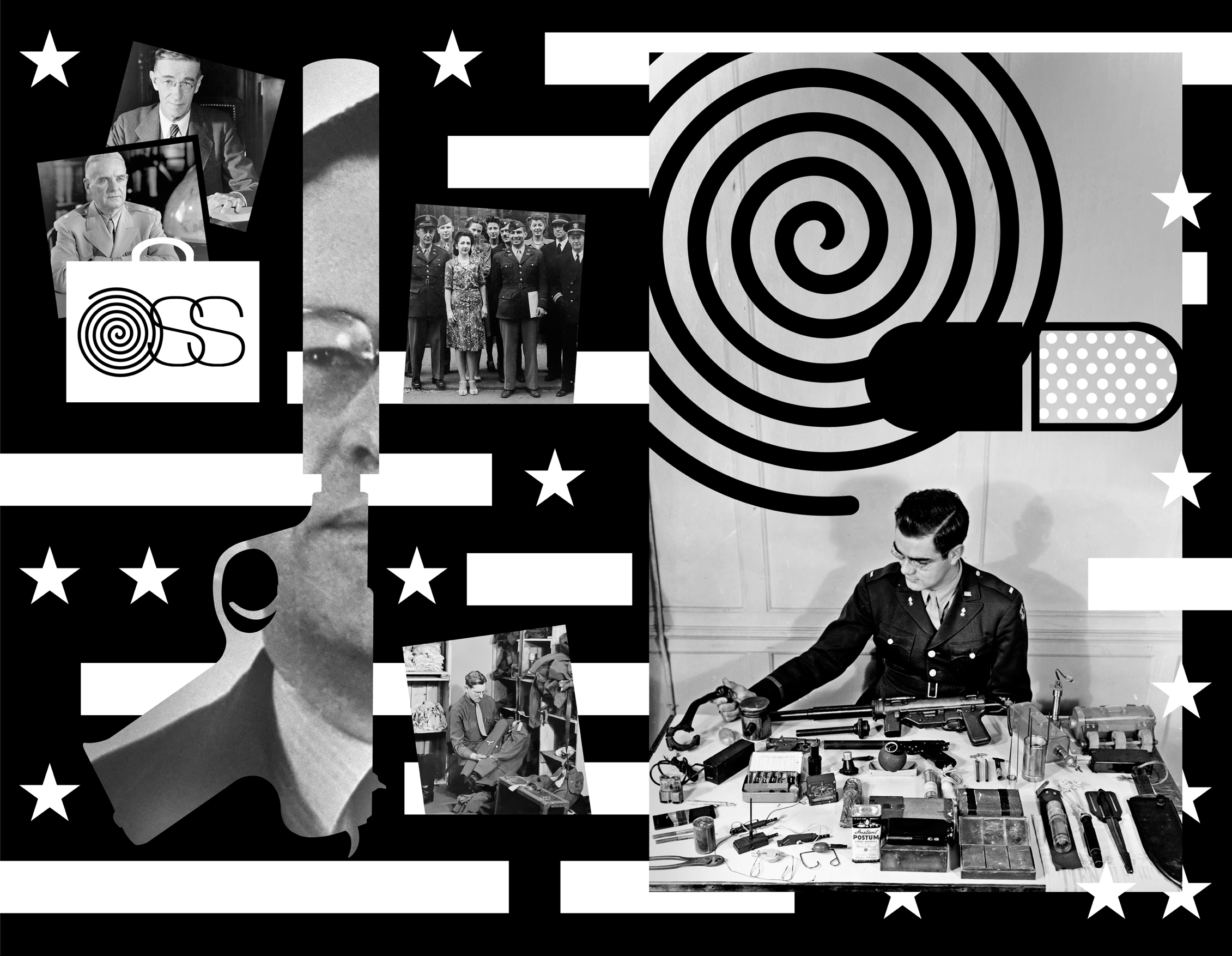
The author and publisher have provided this e-book to you for your personal use only. You may not make this e-book publicly available in any way. Copyright infringement is against the law. If you believe the copy of this e-book you are reading infringes on the authors copyright, please notify the publisher at: us.macmillanusa.com/piracy.
To my parents
Yea, stranger engines for the brunt of war,
Than was the fiery keel at Antwerps bridge
Ill make my servile spirits to invent.
Christopher Marlowe, Doctor Faustus
Oh, what a tangled web we weave,
When first we practice to deceive!
Sir Walter Scott, Marmion
Wild Bill Donovan didnt fear the hellish circumstances of war. Instead, the thrill of combat excited him like a youngster at Halloween, he wrote home to his wife. He had been fighting along the Western Front for less than a year, but in that short time he had already taken shrapnel to his leg, survived a poison gas attack, and rescued Allied soldiers buried under debris, for which the French awarded him the Croix de Guerre medal.
On October 15, 1918, Donovan and his men of the U.S. Armys 69th Infantry Regiment, the Fighting Irish, found themselves bunkered down in shell holes while an onslaught of German bullets grazed the ground. They were supposed to make an advance behind an escort of tanks, but the tanks never showed up. They started anyway.
Donovan leapt out of his muddy hole to lead the advance. As he cleared the ledge, a machine-gun bullet ripped through his right knee, destroying his tibia. He later said that it felt as if somebody had hit me on the back of the leg with a spiked club. Although nauseated from the pain, he continued to yell orders at his men. And despite his injury, none of them dared to disobey. He was known to sock them in the jaw for less, a punch that one soldier said carried enough force to rival a kick from a mule.
While Donovan lay in the crimson-tinted mud with a mangled leg, a German artillery shell exploded in the hole beside him. Three of the men whom he had been yelling at were instantly blown apart. Donovan was showered with the remnants of their bodies. Then, he said, Gas was thrown at us, thick and nasty. He inhaled the noxious fumes. His mind became groggy. His body slumped over.
Five hours later, during a lull in the action, a group of soldiers put Donovan in a blanket and carried him more than a mile through exploding shells and whizzing bulletsone soldier was hit in the processto a makeshift hospital. They arrived to find a harrowing scene. One officer had been shot through the stomach and was bleeding out on the floor. Two more had undergone surgery and were begging their nurse to hold their hands and smooth their brows. Another man died while crying for his wife and children.
Donovan survived his injuries, but he ultimately lost half his regiment, a fact that would weigh heavily on his conscience for years to come. Nevertheless, despite the mental and physical anguish that he had endured, and despite the men whom he had lost, when he returned home from Europe, he hungered for another taste of combat.
In 1923, Donovan was awarded the Medal of Honor for his heroic actions in World War I, making him the most decorated officer in the entire U.S. military. At an emotional ceremony in front of a crowd of four thousand veterans, he unfastened the medal from his neck and gave it to his regiment. Tears welled up in his piercing blue-gray eyes. It doesnt belong with me, he said. It belongs to the boys who are not here, the boys who are resting under the white crosses in France or in the cemeteries of New York, also to the boys who were lucky enough to come through.
Bill Donovan was a star athlete from a tough, working-class neighborhood in Buffalo, New York. He had graduated from Columbia Law School in 1907, the same year that classmate Franklin Roosevelt had dropped out after passing the New York bar exam. The two men differed greatly in their politics and social circlesone was a Republican of humble Irish ancestry, the other a Democrat from the upper classbut they shared a common character defined by bravery, energy, and optimism that would unite them in the years to come.
After World War I, Donovan worked in the Department of Justice as an attorney for the Western District of New York and enforced Prohibition with a vigor that rivaled his appetite for war. He once launched a liquor raid on the famous Saturn Club, a swanky social club in Buffalo to which he himself belonged. Afterward, he told the angry members who called to complain, The law is the law and I have sworn to uphold it.
Donovan himself never drank. Only once did his acquaintance Carleton Coon ever see him hold a glass of amber-tinted liquid, and even then, he never took a sip. Nor did he smoke, Coon added.
During the 1928 presidential election, Donovan campaigned and wrote speeches for Republican candidate Herbert Hoover, who promised to make Donovan the attorney general if he won. Hoover did win, but he reneged on the promise under pressure from a group of anti-Catholic Southerners. A contemptuous Donovan thereafter resigned from the Department of Justice and opened a private law firm. He then ran to succeed Franklin Roosevelt as governor of New York, but he lost the electionin part because of grudges held over from the Saturn Club raid.
Although Donovan was a Republican, he wasnt against cooperating with the Democrats across the aisle. When Franklin Roosevelt defeated Hoover for the presidency in the midst of the Great Depression, he sent Donovan on a series of trips to Europe to gather information on the state of international affairs (and to gather rare stamps for Roosevelts private collection). On one of these trips, Donovan spoke with high-ranking members of the Nazi Party and sensed that their authoritarian calls to restore Germanys pride, rebuild its military, and appropriate land from others would inevitably lead to another world war.
Given this prospect, Donovan urged President Roosevelt to create a centralized intelligence organization to oversee the collection of intelligence abroad. Ideally, this organization would rise above the bureaucratic rivalries that stymied other intelligence organizationsthe Federal Bureau of Investigation, the Armys Military Intelligence Division, the Office of Naval Intelligenceand provide the president with the most accurate and up-to-date information possible. Donovan also wanted this centralized intelligence organization to engage in espionage, sabotage, propaganda, and disinformation campaigns against Americas enemies. Modern war operates on more fronts than battle fronts, he explained to Secretary of the Navy Frank Knox. Each combatant seeks to dominate the whole field of communications. No defense system is effective unless it recognizes and deals with this fact.
For thousands of years, humans had fought by land and sea. In the early twentieth century, they had added aerial combat to the mix. Now, Donovan reasoned, the United States needed to officially expand its arsenal to include a fourth domain: Underground.
On September 1, 1939, a blitzkrieg of German tanks, planes, and soldiers poured east into neighboring Poland, initiating World War II. Donovans plea to Roosevelt to create a centralized intelligence organization grew louder, and Roosevelt grew more receptive. He confided in a letter to Secretary Knox, Bill Donovan is an old friend of minewe were in law school togetherand frankly, I should like to have him in the Cabinet, not only for his own ability, but also to repair in a sense the very great injustice done him by President Hoover.



